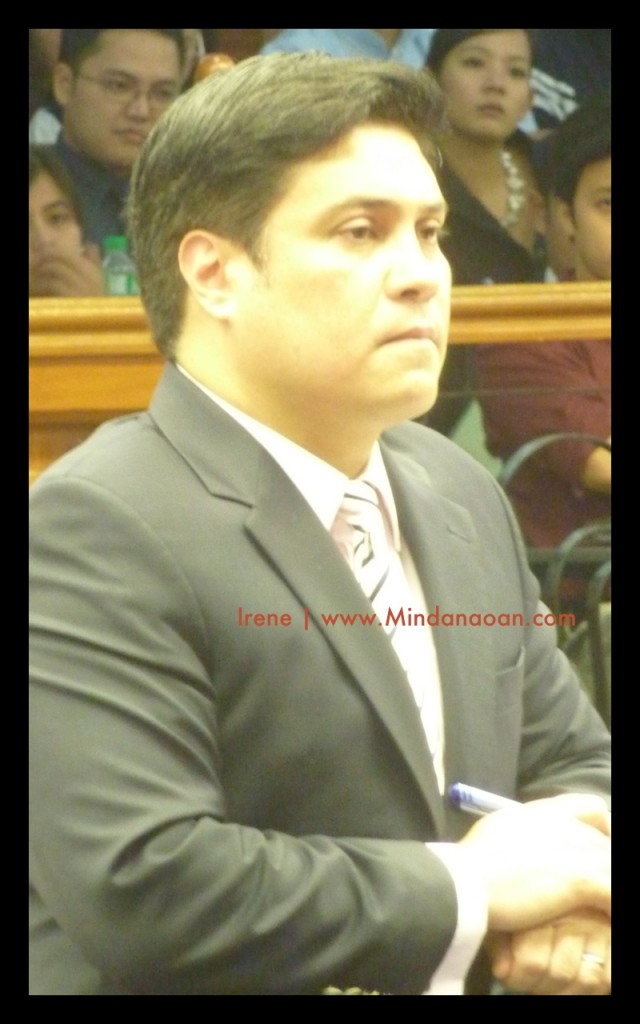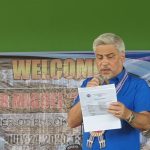Here is the full text of the privilege speech of Senator Juan Miguel Zubiri on the alleged smuggling of black corals in the Philippines. Senator Miguel Zubiri delivered this speech today, May 30, 2011. Zubiri’s speech was prompted by the recent confiscation of multi-million peso worth of black corals in Cebu.
The Rape of Our Ocean (privilege speech of Senator Migs Zubiri on the poaching of corals in the Philippines)
Mr. President, distinguished colleagues, I rise on an issue that has been the newspaper headlines and the topic of many discussions on social network, particularly on Facebook and Twitter, for the past week. Dubbed by the Philippine Daily Inquirer as “the rape of the ocean”, I refer to the confiscated black corals, stuffed hawksbill turtles and other marine species.
Mr. President, I condemn in the strongest possible terms this environmental crime and serious threat to our marine biodiversity perpetrated by some greedy and unscrupulous members of our society. This crime is a direct affront to all our efforts in protecting and conserving our environment, particularly our diverse marine ecosystems. This is a mockery of our environmental laws. May I add that this is also tantamount to economic sabotage.
Mr. President, this morning this representation went to the Port Area in Manila to inspect these confiscated marine items. I saw with my own eyes the huge number of these items and could only surmise that really, vast area of our reef complex had been destroyed as a result of this illegal and illicit trade.
Distinguished colleagues, let me relate the circumstances behind this “high crime on Philippine seas”. On May 1, 2011 Super Ferry 5 arrived at the Eva Macapagal Domestic Terminal in Pier 15, South Harbor Manila from the Port of Cotabato. It has on its cargo two-20 footer container vans declared as containing “rubber” and consigned to a certain Mr. Exequiel Navarro. On May 2, 2011, acting on a tip of an informer, elements of the Enforcement and Security Service of the Customs Police Division of the Port of Manila conducted an operation and apprehended the said shipment from Cotabato City. Instead of rubber, the container vans yielded 134 bundles with 21,169 pieces of dried black corals (Sea Fans), 161 stuffed hawksbill and green turtles, 15 bundles or 196 kilograms of Sea Whips and 209 bundles or 7,340 pieces of rare sea shells. The Bureau of Customs immediately seized the items and coordinated with the DENR’s Protected Areas and Wildlife Bureau and DA’s Bureau of Fisheries and Aquatic Resources. The items were reportedly taken or harvested from the Moro Gulf and the Sulu Sea.
Black corals are creatures found in seas all over the world. They are common in depths of 300 meters. They grow in tree or bush-like forms. Despite the name, they vary in color from white to red, green, yellow or brown, and is seldom black. Growing at a rate of 8-22 micrometers per year, the black corals are the slowest growing deep-sea corals. Due to their luster and flexibility, black corals are being harvested for centuries to make jewelry, handicrafts and ornaments or decorative items for homes, offices and fish aquariums. Lately, the search for the source of prostaglandin which is used as pain-killer, has driven up the demand for black corals.
Under BFAR Administrative Order No. 202, Series of 2000, harvesting and trade of black corals are prohibited and under CITES 1, which the Philippines is a signatory, trade of hawksbill turtles (an endangered species) is also prohibited.
On May 3, 2011 the consignee of the contraband, Mr. Exequiel Navarro appeared at the Bureau of Customs and executed an affidavit. Mr. Navarro promised to cooperate with the investigation and give the names of the financiers of this syndicate and other persons involved in this crime.
The confiscated items are estimated to be worth 35 million pesos only. I said 35 million pesos only because the damage it caused our marine ecosystems and the potential economic loss due to degraded fishing grounds and tourism income are invaluable. Not to mention the time, effort and resources many sectors of our society put and spend to protect, rehabilitate and conserve our marine biodiversity.
The World Wildlife Fund estimated in 1994 that the “economic cost” over a 25-year period of destroying one kilometer of coral reef is between US$137,000. and US$1,200,000. or PhP6,165,000. and PhP54,000,000. at PhP45. to US$1 exchange rate. That is just a kilometer of coral reef. Recent estimate of Mr. Gary Williams of the California Academy of Sciences, a world-renowned expert on corals who is incidentally in the country conducting research in Anilao, Batangas told PAWB officials that the area damaged or destroyed could reach up to 190.8 square kilometers or about five times the size of the City of Manila (38.5 km2).
Yet, even before I could finish writing this speech, another shipment of black corals was intercepted and confiscated, this time in Cebu. The shipment, declared as “scrap metals” came from Manila on board the MV Lorcon Manila. The contraband yielded 168 sacks containing 375 pieces of black sea fan corals and estimated to be worth 15 million pesos.
Mr. President, the perpetrators of this “high crime on our seas” had pushed-back the decades-long efforts of the government, environmentalists, LGUs and NGOs in protecting and conserving our marine ecosystems.
It pains me to see that this is happening just as we celebrated the International Year of Biodiversity last year and environmental campaigns and programs are abuzz in all sectors of our society whether in media, business sector, civil society and more so in the government sector, we all have programs or awareness campaigns for the protection and conservation of the environment. We in the Legislative branch integrate environmental factors in our legislations and state policies as we realized that we can not sustain development and progress at the expense of the environment.
If we lose our corals and marine biodiversity, we will lose these marine grounds where the fish spawn, lay eggs and feed on. In short, we will lose our rich fishing grounds and deprive millions of Filipinos who rely on fishing for their livelihood as well as pose threat to our food security.
Mr. President, di ko po lubos maisip, ano pa ba ang di maintindihan ng ilan nating sakim na kababayan sa relationship na ito ng tao at ng kalikasan? Bakit patuloy and walang habas na pagsira sa ating kalikasan kapalit ng konting kaginhawahan? Di ba nila naiisip na sa ganitong mga gawain ay winawasak rin nila ang kinabukasan ng mga susunod pa nating henerasyon?
In the 14th Congress, we passed RA 9512 or the Environmental Awareness and Education Act of 2008 which requires environmental education in elementary, secondary, vocational and tertiary levels. Mukhang nagkamali po yata tayo sa Kongreso. Dapat po yata ang mga matatanda na ang ni-require natin na magkaroon ng environmental education, especially our businessmen. I am mulling right now to file a bill that will require all existing companies operating in the country to send their executives and operations personnel to study our environmental laws. And for new registrants, for their executives or stockholders to do the same before their business registration or licenses be issued. I believe Mr. President, that we can no longer separate the issue of the environment and business operations in the country.
Mr. President, this time allow me to give credit where credit is due. I commend the Bureau of Customs for immediately acting on the tip of the informer and immediately intercepting the illegal shipment. Also for its smooth coordination with PAWB and BFAR and the said agencies for responding quickly. Although, it would have been better if this crime was stopped or prevented from happening on site or from the source, by our Coast Guard, Maritime Police, local government units, local Bantay Dagat groups and local communities. These agencies are our first line of defense and Customs is somewhat our last defense in this fight against illegal wildlife trade. Once these items leave our ports for the international market, it would be very difficult for us to stop this illegal trade. We can not just rely on our poorly-equipped and resource-deprived Coast Guard and maritime Police of the PNP. Cooperation and vigilance of the local community is crucial to stop this illegal trade.
And to the “face-less” informer, whom we can not name at this time for security reasons and as the investigation is still on-going, we salute you! You have already made a great contribution to the nation, far greater than many of us in the government service have done. I will be honoured to meet you in person and I also hope that at the proper time, the Senate can properly give you the commendation you deserved with your deed. I also pray that may your breed multiply.
Mr. President, we could not let this high crime pass without our scrutiny. Your Committee on Environment and Natural Resources, once this issue has been referred to it, is prepared to get to the bottom of this. We will expose all the people behind this crime, particularly the financier and masterminds of this syndicate. We should help our law enforcement agencies find the legal arsenal and file the highest possible charges in court and muster the political will to break the backbone of this syndicate. We also call on the DOJ or Bureau of Immigration to immediately put on hold-departure list the names of the people being investigated for this crime. We also request the Supreme Court to expedite the creation or organization of our Environmental Courts.
Mr. President, may this serve as a warning to all who committed “crimes against the environment” and those who are about to commit such crimes, I will not stop exposing your high crimes. If need be, I will take the Senate floor, everyday, to expose your unconscionable deeds. With that Mr. President, I call on our vigilant citizens to report to us these crimes against the environment. The concerted efforts of our agencies and a vigilant public are the best defense against these environmental crimes.
Maraming Salamat po!
Related Images:

Mindanaoan is a multi-awarded blogger, content creator, seasoned social media strategist and publicist with undeniably successful track record. 2012 International Visitor Leadership Program (for global leaders) alumnus and O visa grantee (for people with extraordinary skills and who have risen to the top of their field). Avid traveler and a proud relief operations volunteer. Regular resource person for social media, blogging and content creation. Available for work and travel – [email protected]








